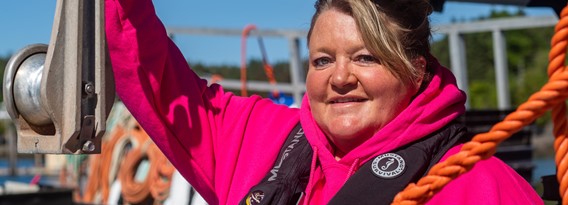

 COMMERCIAL FISHING IN NEW BRUNSWICK
COMMERCIAL FISHING IN NEW BRUNSWICK
Fishing is widely recognized as one of the most dangerous professions. The Globe and Mail published statistics in 2017 showing that the fishing industry is the most deadly sector in Canada, with three out of the top six deadliest jobs coming from the fishing industry. They are:
The job of a fish harvester is 14 times more deadly than that of a police officer. Unlike other dangerous jobs in which the accident and death rates have improved over the years, fishing deaths today are as frequent as they were in 1999, according to the Transportation Safety Board of Canada.
Why does the Occupational Health and Safety (OHS) Act need to change in New Brunswick?
Most importantly, the Act needs to change to make fishing safer for crews and their captains. Their families would rest a little easier knowing there are rules in place to protect their loved ones’ well-being. Currently, however, there are two significant gaps in the OHS Act that prevent WorkSafeNB from helping the industry to full effect.
|
Gap Gap 1: No Authority The definition of ‘place of employment’ does not include fishing vessels so WorkSafeNB has no authority to regulate safety on fishing vessels.
Gap 2: PFD Selection and Use The regulations state that employees exposed to a risk of drowning must use protective measures, including PFDs or lifejackets. Current legislation for PFD or lifejacket selection and use for employees at risk of drowning does not cite current standards for those items. |
Closing the Gap With “places of employment” redefined to include fishing vessels, captains will have legislated safety obligations and will be bound by general duty principles to provide healthy and safe workplaces. They will have access to WorkSafeNB prevention resources for advice and enforcement, leading to safer workplaces. Once fishing vessels are considered a place of employment, employers/captains will be required to provide their crew with PFDs and lifejackets approved by Transport Canada, consistent with the standards adopted across the country. It would be mandatory to wear a PFD or lifejacket on fishing vessels. |
Is the fishing industry served by other provincial occupational health and safety boards?
Of all the jurisdictions in Canada that have a commercial fishing industry, New Brunswick is only one of two jurisdictions without occupational health and safety authority over the industry.
Will the fishing industry have to pay for workers’ compensation?
These proposed legislative amendments are limited to the Occupational Health and Safety Act and, at this time, will not require the fishing industry to pay assessments, but voluntary coverage is encouraged.
There are currently 22 employers in the fishing industry taking advantage of voluntary coverage. They do so to protect themselves and their workers. WorkSafeNB workers’ compensation coverage is a no-fault insurance system that protects both the employers who pay for it and the workers who receive benefits.
With voluntary coverage, a captain (or boat owner) ensures any crew member who suffers a work-related injury or illness is eligible for health care, wage loss, and rehabilitation benefits. Additionally, employers who opt for voluntary coverage are protected from lawsuits by workers who are injured on the job. This means that workers give up the right to sue employers in the event of a workplace injury in exchange for covering the cost of health care and rehabilitation services, as well as wage loss benefits.